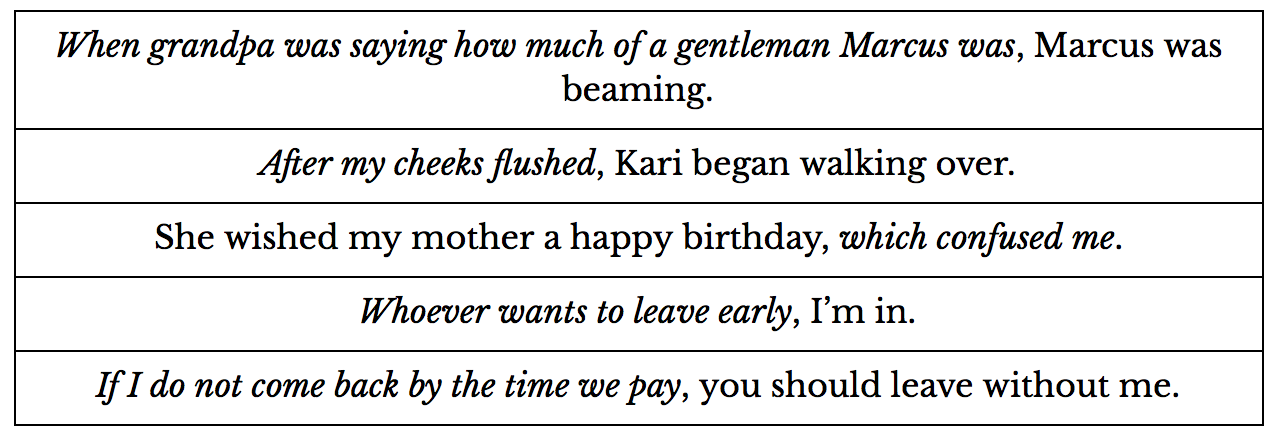
Part i. Parts of Speech
Before you dive into the Writing Section, I'd just like to summarize a brief introduction of English grammar. That way, when I mention these terms in future parts, you'll understand, and perhaps, refer back to this part if need be.
Let's start off with the basics.
Verbs are words that show action or state of being. They also indicate the time the action or state of being occurs: present, past, or future.
Transitive verbs take their action on something⏤the object. If you remove the object from these sentences, they don't make sense:

Intransitive verbs don't need an object; they can take action all by themselves. No object is necessary in these sentences:

Action verbs are exactly what they sound like: they describe action. Verbs such as run, jump, and swim are action verbs.
Linking verbs describe a state of being. The action isn't so rugged, but more thoughtful, connective, or complicated. Linking verbs aren't about actions as much as they are about connecting other words together.
The verb to be is the basic linking verb. The word is is a form of the verb to be. If I say, "Hannah is nervous," the main purpose of is is to link the word Hannah with the word nervous.
Other linking verbs include seem, appear, look, become, and verbs that describe senses, such as feel and smell.
Participles are verbals that function as adjectives. Present participles end in -ing (singing); past participles usually end in -ed (excited), -t (built), -k (drunk), or -n (eaten). Because participles function as adjectives, they usually appear next to the noun they modify. In the following table, the participles will have a (p) above it and the nouns will have an (n).

Infinitives are verbals that begin with to, followed by the base of the verb.

Nouns are words that name persons, places, things, or ideas. Things can be concrete, like rocks, or abstract ideas, like courage or purpose.
A pronoun is a word that takes place of a noun. Notice how pronouns replace some of the nouns in the following sentences:

These words that substitute for specific persons, places, or things are personal pronouns. They are the most common pronouns. Other personal pronouns include: I, me, we, us, you, him, her, they, and them.
Indefinite pronouns, on the other hand, do not refer to specific persons, places, or things. They include words like: each, everyone, everybody, anyone, somebody, both, some, all, and most. Look at these sentences that contain indefinite pronouns:

Adjectives are words that describe nouns or pronouns. Adjectives usually come right before the words that they describe; however, sometimes they come after linking verbs. Look at the following sentences that contain adjectives:

The articles a, an, and the are always adjectives. Since articles modify nouns and pronouns, they are adjectives. Take a look at the following sentences that contain articles:

Adverbs are words that describe verbs, adjectives, or other adverbs. When trying to find adverbs, look for words that tell how, when, or where. Remember that many adverbs⏤but not all⏤end in -ly. Look at the following sentences to spot the adverbs:

Prepositions are words that connect a noun or a pronoun to the rest of the sentence. Prepositions include words like around, during, in, of, on, to, under, with.
A phrase is a group of related words that functions as a simple part of speech⏤a noun, a verb, an adjective, or an adverb. It does not contain both a subject and a verb.
A prepositional phrase starts with a preposition and ends with a noun or a pronoun. Look at the following sentences that contain prepositional phrases:

Conjunctions are words that join two or more words, groups of words, or sentences. Conjunctions that join equal sentences or equal parts of sentences are coordinating conjunctions. They are and, but, or, nor, for, so, yet. Look at the following sentences that contain coordinating conjunctions:

Subordinating conjunctions join parts of sentences that are not equal. These include words like after, although, because, before, if, since, until, and where. Look at the following sentences that contain subordinating conjunctions:

Interjections show strong feeling or emotion and are usually set off from the rest of the sentence with an exclamation point. Mild interjections⏤words like oh, well, yes, no⏤are set off by commas. Interjections are not grammatically related to the rest of the sentence. Look at the following sentences that contain interjections:

An independent clause, also called a main clause, is another name for a complete sentence.

A dependent clause, also called a subordinate clause, cannot stand alone as a sentence. Even though it has a subject and a verb, it is not complete. It depends on the rest of the sentence to make sense. The following clauses have subjects and verbs, but they are not complete sentences:

Dependent clauses never stand alone as a sentence. Notice how these clauses fit into complete sentences:

If I haven't time-warped you back just yet, I'm glad. Hopefully, a few things seemed familiar, and you are confident moving forward in the writing process.
Now to the fun stuff... Brainstorming titles!
A/N: Wattpad has an image limit per post: 20. Who knew?
Bạn đang đọc truyện trên: Truyen247.Pro